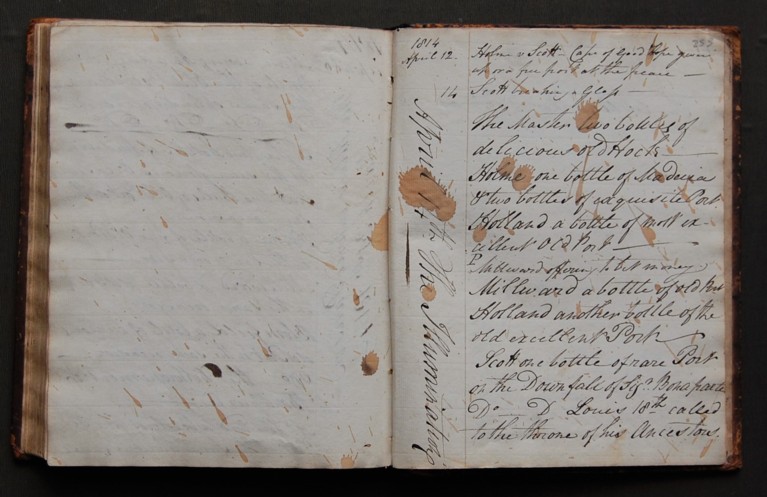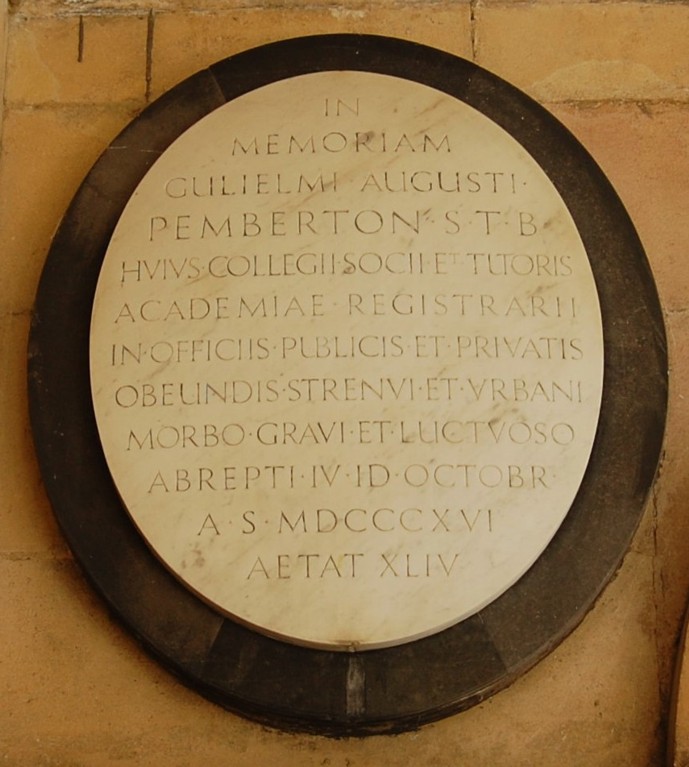Blog
7 June 2023

Parlour Wager Book, 14th April 1814
Emmanuel’s parlour wager books record the bets made between the Master, the Fellows, and fellow commoner students. They also note important national celebrations, which the parlour usually saluted with a selection of fine and fortified wines. On 18 June 1835 the Revd James Bunch, a Fellow of Emmanuel, gave the parlour ‘a bottle to commemorate the glorious battle of Waterloo’. This was on the 20th anniversary of the momentous military encounter that ended the Napoleonic Wars. Curiously, though, the wager book covering the summer of 1815 contains not a single word about the battle.
An explanation for this strange silence can, perhaps, be found in entries made the previous year. The pages covering 6-14th April 1814 are quite unlike any others in that volume. Indeed, they radiate an almost palpable excitement, with their extra-large handwriting and jubilant marginal annotations. The first entry reads, breathlessly: ‘Pemberton two bottles of London Particular Madeira & one bottle of Old Port to congratulate the World on the Allies having intered Paris’. A misspelling could be forgiven under such circumstances, and the perpendicular marginal note explaining the cause of the celebrations is positively incoherent: ‘April 6th 1814 Paris entered March 31 and taken on March 30’. (The Battle of Paris, 30-31 March, had been followed by Napoleon’s surrender to the Allies on 6 April.) Pemberton’s vinous contribution was emulated by other members of the parlour, who celebrated ‘the Downfall of Sigr Bonaparte’ with a total of 26 bottles, including a ‘Magnum bohum of Old Port’ (Henry Holland), ‘two bottles of prime Bourdeaux Claret’ (James Mainwaring), and ‘a bottle of La Fite’ (Pemberton, again).
A week later it was party time once more, when the Master, Dr Cory, gave two bottles of ‘delicious old Hock’, and the Fellows contributed another nine bottles of port and madeira. The marginal note on this page of the wager book, ‘April 14th The Illumination’, records the fact that this was a day of national victory celebrations, with spectacular light-shows being put on in London. The entire page is bespattered with what look suspiciously like red wine stains. More toasting marked the formal ‘Proclamation of Peace’ on 27 June, when the parlour enjoyed four bottles of hock, madeira and port, and Pemberton came up trumps again with two bottles of ‘exquisite Carbo’. William Pemberton, University Registrary and an Emmanuel Fellow since 1796, was a convivial member of the parlour who contributed countless bottles during his 20-year fellowship. He is commemorated on a plaque in the chapel cloisters.

William Pemberton's Memorial at Emmanuel
Napoleon was banished to the island of Elba after the Battle of Paris. The sequel is well known; on 26 February 1815 he sailed for France and on 20 March entered Paris with an army. The shock and fear this turn of events caused across Europe is difficult to overstate, yet Emmanuel’s wager books are almost silent on the subject. On 13 March Pemberton made an over-optimistic bet that Buonaparte would be ‘either a prisoner or out of France in six weeks’, but there is no other mention of the political situation until autumn, several months after Napoleon had been defeated at Waterloo and dispatched to his final exile on St Helena. One can only imagine that after the wildly excessive rejoicings of the previous year, the Fellows were in no mood for another bacchanal. There may also have been a lurking fear that Napoleon could pull off the same trick twice. Whatever the reasons, the parlour seems to have been a model of sobriety throughout the national celebrations in the summer of 1815.
Amanda Goode, College Archivist
